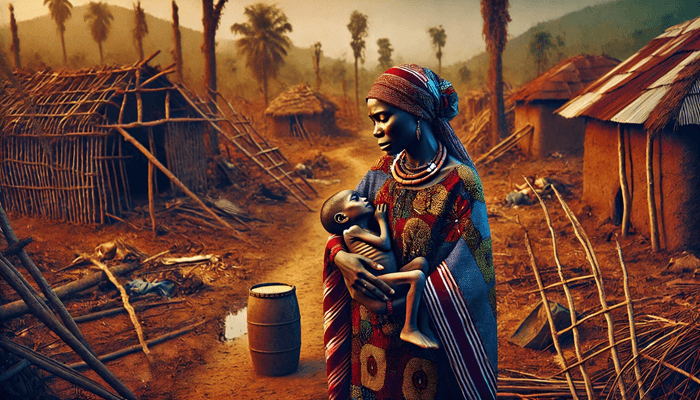The Igbo People and the Nigerian-Biafran War

The Nigerian-Biafran War, a.k.a the Nigerian Civil War, is arguably one of the most pivotal moments in the history of Nigeria and the Igbo people. This conflict, which lasted from 1967 to 1970, was more than just a war of guns raised against the occupiers, it was one of titanic struggle for identity, a matter of life and death for the Igbo people behind the secessionist Republic of Biafra. The consequences of the war were both devastating and long-lasting, transforming the socio-political dynamics of Nigeria and leaving deep scars on the Igbo community.
Historical Context and the Path to War
The origins of the Nigerian-Biafran War can be traced back to the colonial unification of Nigeria in 1914, when disparate ethnic groups with different languages, cultures and religions were lumped together. After gaining independence, Nigeria experienced political instability, ethnic tensions, and competing factions jockeyed for control over resources and power. The Igbo people, primarily in southeastern Nigeria, were business-minded and soon became a leading group in business, education, and the civil service.
But this success also created resentment among members of other ethnic groups, especially in the Northern Region. Tensions boiled over after the January 1966 coup, which was predominantly executed by Igbo officers, and involved the assassination of many Northern political leaders. While the coup was not an ethnically motivated Igbo agenda but were perceived as one, hence, the anti-Igbo sentiments engulfed the nation. A counter-coup the following July reestablished Northern power and unleashed SS-inspired pogroms against Igbo civilians in the North, resulting in the deaths of tens of thousands and the displacement of millions more. In reaction Colonel Odumegwu Ojukwu on May 30, 1967, declared the southeastern region the independent Republic of Biafra, plunging the country into war.
The Human Cost of the War
Here was the Nigerian-Biafran War, one of the most horrific conflicts in history.) The Nigerian government’s blockade of Biafra caused widespread famine, with some 2 million civilians — many of them children — perishing from starvation. Heart-rending images of famished Biafran children horrified the world, sparking international humanitarian efforts but also underscoring the catastrophic price of the fighting.
For the Igbo, the war meant the loss of hundreds of thousands of lives, homes and livelihoods. Villages were destroyed, families shattered and an entire generation was raised in violence and dearth. The psychological scars of that experience are still present today, with accounts from survivors speaking of the hardships endured.
Post-War Reconstruction and Marginalization
After Biafra’s surrender in January 1970, the Nigerian government, led by General Yakubu Gowon, announced a “No Victor, No Vanquished” policy. But the reality confronted the Igbo people with a starkly non-reconciliatory face. Igbo properties confiscated in other regions of Nigeria were seldom returned, and Igbo people faced discrimination in employment, education and politics. A policy restricting bank withdrawals for Biafrans to a paltry 20 Nigerian pounds — no matter how much they had saved before — left many economically devastated.
In the face of these challenges, the Igbo community exhibited extraordinary resilience. By sheer force of will, they reconstructed their businesses and communities, re-creating themselves as vital contributors to Nigeria’s economy. But the war’s legacy of distrust and marginalization still affects Igbo perceptions about their position within the Nigerian federation.
Cultural and Political Ramifications
The Nigerian-Biafran War had a profound impact on Igbo cultural identity. The war galvanized a feeling of Igbo solidarity and pride, solidifying an intense determination to protect their language, customs and ways of life. Thise themes of survival, loss, and hope visceral in Igbo literature, music and art that is a catharsis, and a medium of history preservation.
The war had a political effect of making Igbo wary towards Nigerian politics. Others feel left out of crucial political and economic decision-making processes, which has prompted calls for greater regional autonomy — or, in some quarters, renewed talk of secession. Whenever people raise issues, they are stoned, whether it is IPOB or others, for them to seek the Biafran dream but through non- violence, it clearly shows that details have not yet been settled between the Igbo and Nigerian State.
Lessons and the Path Forward
The Nigerian-Biafran War is a sobering reminder of the perils of ethnic divisions, inadequate governance and restrictions to self-determination. For Nigeria to truly heal, it needs to — confront all of the underlying causes of the war and aftermath, which includes equitable allocation of resources, justice for past evils and inclusive governance.
For the Igbo people, the war represents an agonizing chapter but also a testament to their resilience and creativity. We, particularly the Igbo people are still overcoming a lot of challenges, and are still excelling and trying our best to excel in all areas of life. Ergo, this network helps to initiate a larger dialogue about the need for Nigerian society to embrace a true understanding of the complexities of the Igbo experience and prevent the conditions for such events that may emerge from ignorance, prejudice, and division.
More than fifty years since the Nigerian-Biafran war, the scars of the conflict are still fresh on the Igbo people and Nigeria itself. It is only by facing this history honestly and with empathy that Nigerians can lay the groundwork for a future defined by unity, justice and shared prosperity, engendering a future where the lessons of the past propel the country to a better tomorrow.


